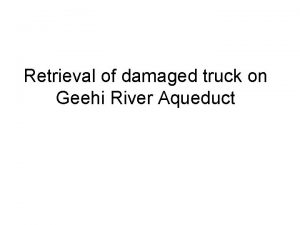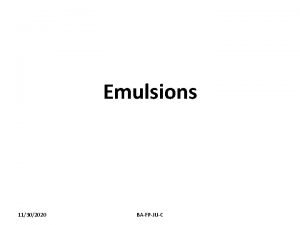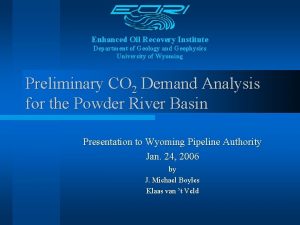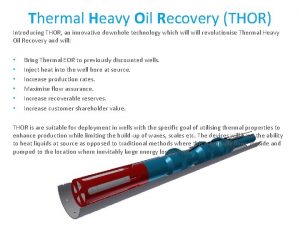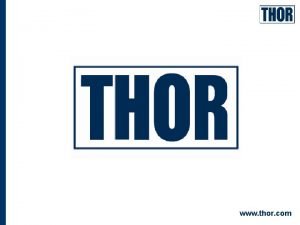Thermal Heavy Oil Recovery THOR Introducing THOR an






- Slides: 6

Thermal Heavy Oil Recovery (THOR) Introducing THOR, an innovative downhole technology which will revolutionise Thermal Heavy Oil Recovery and will: • • • Bring Thermal EOR to previously discounted wells. Inject heat into the well bore at source. Increase production rates. Maximise flow assurance. Increase recoverable reserves. Increase customer shareholder value. THOR is are suitable for deployment in wells with the specific goal of utilising thermal properties to enhance production while limiting the build-up of waxes, scales etc. The devices will have the ability to heat liquids at source as opposed to traditional methods where this is typically done topside and pumped to the location where inevitably large energy losses occur.

Why Heavy Oil? • Only 30% of remaining oil is considered “light oil” while the remaining 70% are considered “heavy oils”. • The International Energy Agency stated that increasing recovery of these heavier crudes could unlock approximately 300 billion barrels. • There approximately 7 billion barrels of known heavy oil to be developed in the UKCS alone. Why Thermal EOR? The best places to find oil are in areas where it’s already been found. Access to new exploration acreage is expensive. Significantly less environmental impact from exploiting known acreage. Thermal EOR processes have the greatest certainty of success and application in about 70% of the EOR market globally. • Recovery rates up to double have been seen but generally increases of c. 20%-50% are readily achievable using thermal EOR. • In 2015 global thermal EOR spending was $23. 9 bn. • •

THOR vs Conventional Thermal EOR THOR Conventional Thermal EOR • • • Power restrictions offshore keep thermal injection rates low (around 250 bpd per injector). If injecting 250 bpd from topside, even with insulated pipe, losses to wellbore would give cold water at reservoir. Heat is lost 250% faster to seawater than sandstone • Thermal injection of 250 bpd per well. • Very little heat loss as heating takes place downhole near the reservoir. • Significantly smaller footprint than traditional thermal/steam generation • Green power sources could be used to power our devices.

THOR Key Benefits • • • Flexible power options. Safe; no ignition source. Downhole: Hot, high quality thermal injection directly into reservoir. Minimal cooling in long horizontals. Viable offshore: Downhole motor bypasses high heat losses to ocean (heat is lost 250% faster to water than sandstone). Could be retrofitted to fields not designed for thermal EOR to extend field life. Less sensitive to water quality than current thermal EOR methods. Has applications in both injection and production wells Could be used for combined thermal and chemical injection operations. Could be deployed over multiple wells giving total reservoir control. Could be combined with other EOR techniques e. g. Traditional Steam Flood, Solar Steam, Low. Sal and Smart Water flooding.

THOR: Initial Geoscientific Modelling UKCS Paleocene Trubidite Reservoir Modelling Numerous Cavitas units injecting 250 bpd at 120 o. C. Increases reservoir temperature from 42 o. C to 116 o. C. Reduce viscosity from 200 cp to 9 cp (like light oil). Increases ultimate recovery from 17 to 20%. 300 mbbl to 360 mbbl recoverable of a 1. 9 bbbl STOIIP field @ $30 = Extra $1. 8 billion over life of field (30 years). The above figures were calculated using publically available information relating to a real UKCS heavy oil development that is currently in the process of being brought onstream. The planned number of injector wells across the reservoir was 37. Assuming a THOR device was present in each injector well producing heated fluid at 120 o. C would increase the reservoir temperature to 116 o. C. This increase in temperature would reduce the viscosity from 67 cp to 7 cp. This projected reduction in oil viscosity would increase the recovery factor from 1617% (claimed as 300 mbbl) of the slightly under 2 billion in place within the reservoir to 20% (adding 3% or 4%) to 360 mbbl.

Production With THOR Planned Production


